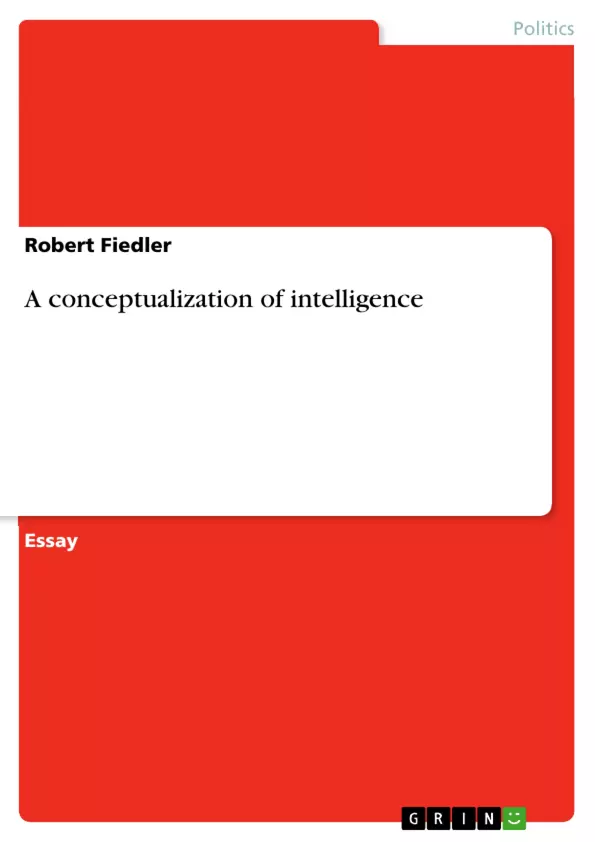Given the evolution of the term intelligence during the last decades, it is easily comprehensible that its pristine meaning becomes blurry. In fact, intelligence “means many things to many people [and] boiling it down to one single definition is difficult” (Warner, 2007, p. 15). The growing “application of the concept or perhaps the illusion of intelligence analysis to various information processing activities that are not really intelligence in the professional sense of the word” (Agrell, 2002, p. 4) increases the difficulties to formulate a precise and applicable definition. Nevertheless in a “business as old as recorded history, one would expect to find a sophisticated understanding of just what that business is, what it does and how it works” (Warner, 2007, p. 15). Therefore it is the more astonishing that “all attempts to develop ambitious theories of intelligence have failed” (Laqueur, 1985, p. 8). In the following this paper will analyze some problems of finding a universally agreed upon definition of intelligence before the attempt to find a own conceptualization.
Inhaltsverzeichnis (Table of Contents)
- A conceptualization of intelligence
- Reasons for the difficulties to find a universal definition
- Discordance about the term intelligence within the IC
- Divergences in the international context
- Simplification
- A concept of intelligence
- Intelligence and information
- Intelligence and knowledge
- Information requirements
- Secrecy
- Intelligence and action
- Conclusion
Zielsetzung und Themenschwerpunkte (Objectives and Key Themes)
This paper aims to explore the challenges of defining intelligence and to develop a concept of intelligence that encompasses its multifaceted nature. It delves into the historical evolution of the term and analyzes various obstacles hindering the creation of a universally accepted definition.
- The evolving definition of intelligence
- The challenges of defining intelligence within the intelligence community (IC)
- The role of secrecy and covert action in intelligence
- The transformation of information into knowledge and action
- The complex relationship between intelligence, information, and knowledge
Zusammenfassung der Kapitel (Chapter Summaries)
- The first section examines the difficulty of defining intelligence, highlighting the multifaceted nature of the term and the challenges posed by different interpretations within the IC and internationally.
- The second section explores the reasons behind the difficulties in finding a universal definition, focusing on the lack of a clear understanding within the IC, the divergence of interpretations across national boundaries, and the tendency to simplify intelligence to mere information.
- The third section proposes a concept of intelligence, acknowledging that equating intelligence with information is too narrow and that the provision of usable knowledge is a crucial element.
- The fourth section delves into the relationship between intelligence and information, highlighting the importance of information requirements and the critical role of secrecy in professional intelligence.
- The fifth section examines the transformation of data into usable knowledge, emphasizing the analytical process involved in intelligence and the significance of covert actions in shaping international events.
Schlüsselwörter (Keywords)
Key terms and concepts explored in this paper include: intelligence, definition, intelligence community (IC), information, knowledge, secrecy, covert action, international competition, policy priorities, international system, and analytical process.
- Quote paper
- MSc. M.A. Robert Fiedler (Author), 2008, A conceptualization of intelligence, Munich, GRIN Verlag, https://www.grin.com/document/163699



